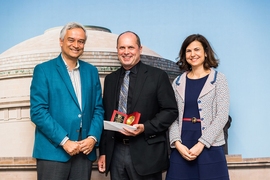Chris Caplice PhD ’96, executive director of the MIT Center for Transportation and Logistics, has been appointed MIT senior research scientist for his long-term commitment to research and education in supply chain management. Over the past two decades, Caplice has developed and deployed theoretical models and educational innovations that have had a global impact on supply chain practice and education. In 2016, Caplice was named a Silver Family Research Fellow and became the only nonfaculty member at MIT to receive an endowed chair.
Most recently, Dr. Chris (as his online learners refer to him) was recognized for innovations in education both online and on campus. From the MITx Prize for Teaching and Learning with MOOCs to the Irwin Sizer Award for Most Significant Improvement to MIT Education to the student-nominated MIT Teaching with Digital Technology Award, Caplice has been repeatedly recognized for his contributions to supply-chain education. He created and led the first-ever MicroMasters credential program to be offered anywhere. More than a quarter of a million people from 196 different countries have enrolled in one or more of his courses. Over 1,500 learners have completed the full credential, and more than 10,000 are in the pipeline to complete it. This credential is being recognized across sectors for its value and relevance to improving supply chain management competency worldwide.
“Chris’s work has truly advanced the online learning experience — not only for courses in supply chain management, but also for others inspired by his example,” says Sanjay Sarma, MIT vice president for open learning.
Previously, Caplice directed the MIT Master of Engineering in Logistics. He transformed the program from a purely technical and analytics-focused degree to one that includes leadership and management training. Today, this boutique MIT master’s program in its 20th year has over 750 alumni working in leadership roles in some of the world’s largest organizations. His master’s format has served as the foundation for the MIT Global SCALE Network graduate certificate now offered to hundreds of students annually through five collaborating institutions worldwide.
Pioneering education is only Caplice’s most recent contribution to the supply-chain sector and business at large. Beginning right after his MIT PhD, Caplice applied optimization-based procurement models he had studied to create OptiBid. This tool was the first ever to apply combinatorial auctions to freight transportation. Since that time, optimization-based procurement has become an industry-standard practice and is embedded in all professional-grade transportation management systems. Later, while chief scientist at Chainalytics, Caplice developed an econometric pricing model that uncovered hidden costs in shipper-carrier policies. He introduced the parameters of this model in 2004 to a consortium of would-be competitors and collaborators. Aggregating and anonymizing the information allowed these companies and organizations to gain better market information without sharing any confidential material. Today, an unexpected benefit from this work is a “regional freight value” for every three-digit postal code in the United States, widely used by firms to allocate distribution, manufacturing, and other facilities.
Research discoveries in supply chain management may not gather headlines in the same way they do in other disciplines; even so, their impact on daily lives is significant. Caplice’s applied research has influenced daily life in many hidden ways. During the 2000s, he developed scenario-planning models to deliver long-range transportation and infrastructure methodology as part of the Future Freight Flows project. Today, the methodology is used by transportation departments in many U.S. states and has changed the way many agencies interact with the private sector in terms of long-term infrastructure needs. More recently, working with the world’s largest retailer, Caplice designed a stochastic optimization tool that helps them make the best assignment decisions for their fleet and for-hire carriers. This has led to annual savings for the company in the tens of millions of dollars. In addition, it reduced the company’s planning investment time by 75 percent. While these kinds of breakthroughs may not be obvious to the end user, they impact the capability of companies and organizations to create and deliver goods and services that the public can use.
The challenges to supply chains and their management will continue to mount as our societies become more concentrated in globally connected urban environments. Building on past innovations and serving as executive director of the Center for Transportation and Logistics will position Caplice to continue to exert an analytical and practical approach to new challenges for practitioners. As a senior research scientist, he is empowered to manage a diverse portfolio of research and education activities.









